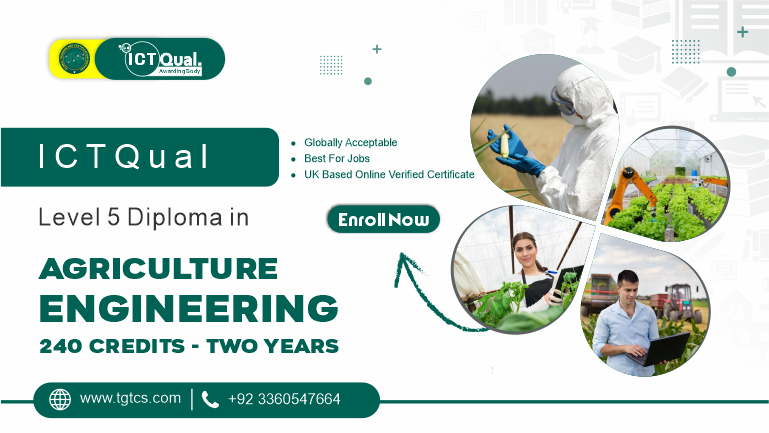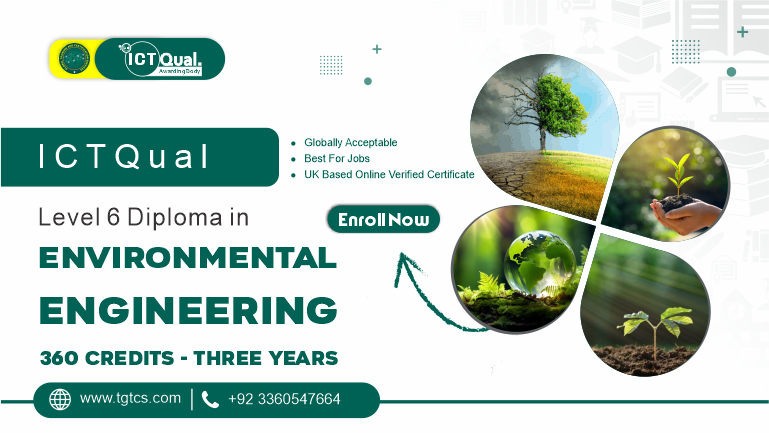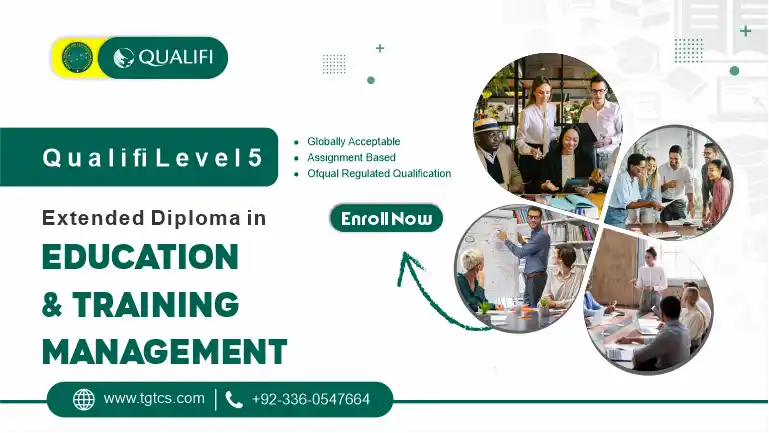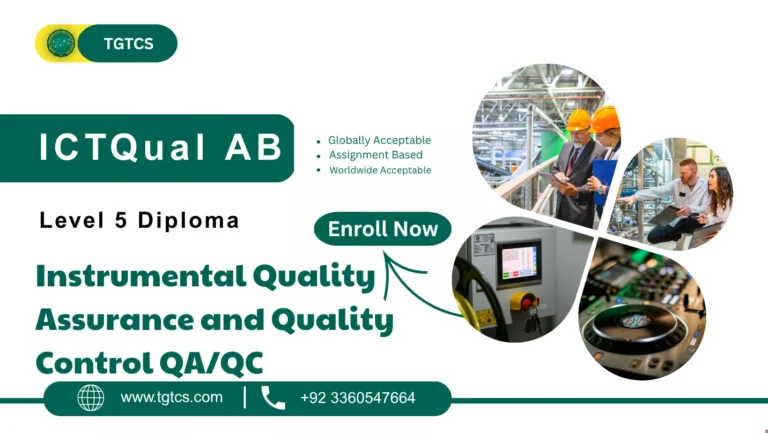ICTQual Level 5 Diploma in Agriculture Engineering 240 Credits – Two Years
Agricultural engineering is a rapidly growing field, blending technology, innovation, and sustainability to shape the future of agriculture. If you’re looking to advance your career in this dynamic sector, the ICTQual Level 5 Diploma in Agricultural Engineering (240 Credits) is the perfect opportunity. This two-year, comprehensive course provides students with in-depth knowledge and hands-on experience in agricultural engineering, paving the way for a rewarding career in one of the world’s most essential industries.
The ICTQual Level 5 Diploma in Agricultural Engineering is a nationally recognized qualification designed to equip learners with the skills and knowledge needed to work at a professional level in the agricultural engineering sector. This course spans two years and awards 240 credits, offering a robust foundation in both theoretical and practical aspects of agricultural engineering.
This course is ideal for individuals looking to gain expertise in agricultural technology, machinery maintenance, precision farming, and sustainable agricultural practices. The program is specifically tailored to meet the demands of the modern agricultural industry, preparing graduates to tackle the challenges faced by farmers and agricultural businesses.
The ICTQual Level 5 Diploma in Agricultural Engineering is an exceptional qualification that prepares you for a successful career in one of the world’s most crucial and evolving industries. Whether you’re aiming for a hands-on technical role or a managerial position in agricultural technology, this course provides the expertise and qualifications needed to thrive.
The Global Training and Certification Services (TGTCS) is Directly Approved Training Centre of ICTQual
The ICTQual Level 5 Diploma in Agricultural Engineering is a two-year, 240-credit qualification designed to equip students with the knowledge and practical skills necessary for a successful career in the agricultural engineering field.
This course covers key areas such as agricultural machinery, precision farming, sustainable practices, and automation in agriculture. With a focus on hands-on experience, students gain valuable industry skills to work in roles like agricultural engineer, farm equipment technician, or agricultural consultant. This diploma not only opens doors to various career opportunities but also provides a pathway for further education. It is an ideal program for anyone looking to advance their career in the evolving agricultural sector.
Mandatory Units
The Units of Level 5 Diploma in Agriculture Engineering 240 Credits-Two Years are as :
Year 1:
- Introduction to Agricultural Engineering Principles
- Applied Mechanics in Agriculture
- Agricultural Machinery and Equipment
- Hydraulics and Pneumatics in Agriculture
- Soil and Water Management Systems
- Electrical and Electronic Systems in Agriculture
- Introduction to Agricultural Structures
- Sustainable Farming Technologies
- Basic Agricultural Safety Practices
- Crop and Livestock Machinery
- Mechanical Design and CAD for Agricultural Engineering
- Introduction to Farm Management
Year 2:
- Advanced Agricultural Engineering Principles
- Renewable Energy Applications in Agriculture
- Advanced Irrigation and Water Management Systems
- Precision Agriculture Technologies
- Farm Mechanization and Automation
- Agricultural Environmental Engineering
- Maintenance and Repair of Agricultural Machinery
- Agricultural Engineering Project Management
- Agricultural Engineering Systems Integration
- Sustainable Farm Design and Layout
- Business and Entrepreneurship in Agricultural Engineering
- Research and Development in Agricultural Engineering
Year 1:
- Introduction to Agricultural Engineering Principles
- Understand the fundamental principles of agricultural engineering.
- Recognize the vital role of engineering in modern farming practices.
- Apply basic engineering concepts to agricultural systems.
- Applied Mechanics in Agriculture
- Demonstrate an understanding of mechanical principles in agriculture.
- Apply concepts of force, motion, and mechanics to farming machinery.
- Solve basic mechanical issues related to agricultural equipment.
- Agricultural Machinery and Equipment
- Identify and describe various types of agricultural machinery.
- Understand the operation, maintenance, and troubleshooting of farming equipment.
- Select appropriate machinery for specific agricultural tasks.
- Hydraulics and Pneumatics in Agriculture
- Understand the principles of hydraulics and pneumatics in agricultural systems.
- Apply hydraulic and pneumatic systems in agricultural machinery.
- Troubleshoot common issues in hydraulic and pneumatic systems.
- Soil and Water Management Systems
- Explain the relationship between soil, water, and agricultural productivity.
- Apply efficient soil and water management practices.
- Design basic irrigation and drainage systems for sustainable farming.
- Electrical and Electronic Systems in Agriculture
- Understand the role of electrical and electronic systems in agriculture.
- Apply basic electrical principles to agricultural machinery.
- Troubleshoot common electrical issues in farming equipment.
- Introduction to Agricultural Structures
- Understand the principles behind the design and construction of agricultural buildings.
- Identify different types of agricultural structures and their uses.
- Learn basic structural safety and sustainability in farming environments.
- Sustainable Farming Technologies
- Recognize the importance of sustainability in agriculture.
- Apply engineering solutions to improve resource efficiency and minimize environmental impact.
- Explore renewable energy technologies used in farming.
- Basic Agricultural Safety Practices
- Identify potential hazards in agricultural environments.
- Understand health and safety practices specific to agricultural engineering.
- Implement safe practices for operating and maintaining machinery.
- Crop and Livestock Machinery
- Identify and understand the function of machinery used in crop and livestock production.
- Apply operational knowledge to the effective use of these machines.
- Troubleshoot and maintain crop and livestock machinery.
- Mechanical Design and CAD for Agricultural Engineering
- Apply mechanical design principles to agricultural engineering projects.
- Use computer-aided design (CAD) tools to create engineering designs for agricultural machinery.
- Develop prototypes based on CAD designs.
- Introduction to Farm Management
- Understand the basics of farm management and agricultural operations.
- Apply concepts of resource planning, budgeting, and farm optimization.
- Recognize the role of engineering in improving farm efficiency.
Year 2:
- Advanced Agricultural Engineering Principles
- Deepen understanding of engineering principles in agricultural systems.
- Solve complex engineering problems related to agriculture.
- Apply advanced concepts in mechanics, thermodynamics, and materials science.
- Renewable Energy Applications in Agriculture
- Understand the use of renewable energy sources in agricultural operations.
- Design systems that integrate solar, wind, and biomass energy into farming.
- Evaluate the environmental and cost benefits of renewable energy solutions.
- Advanced Irrigation and Water Management Systems
- Design and implement advanced irrigation systems.
- Utilize modern technologies to optimize water usage on farms.
- Address challenges related to water management and conservation.
- Precision Agriculture Technologies
- Apply GPS, remote sensing, and data analytics to optimize agricultural production.
- Understand how precision farming technologies improve efficiency and yield.
- Implement precision agriculture solutions to reduce costs and enhance sustainability.
- Farm Mechanization and Automation
- Explore the integration of automation in agricultural machinery.
- Understand the role of robotics and autonomous systems in modern farming.
- Apply mechanization to improve productivity and reduce labor costs.
- Agricultural Environmental Engineering
- Identify environmental challenges in agriculture.
- Develop engineering solutions to reduce environmental impacts like soil erosion, waste, and pollution.
- Apply sustainable engineering practices to agricultural systems.
- Maintenance and Repair of Agricultural Machinery
- Develop skills to maintain and repair agricultural machinery and equipment.
- Diagnose mechanical issues and implement effective repair solutions.
- Understand the importance of regular maintenance for equipment longevity.
- Agricultural Engineering Project Management
- Understand project management principles in agricultural engineering projects.
- Plan, execute, and manage projects from initiation to completion.
- Apply budgeting, scheduling, and resource management techniques.
- Agricultural Engineering Systems Integration
- Integrate agricultural systems (machinery, irrigation, automation) into cohesive units.
- Solve integration challenges within farm engineering.
- Ensure efficient collaboration of systems to optimize farm performance.
- Sustainable Farm Design and Layout
- Design farms with a focus on sustainability, optimizing land and resource use.
- Implement engineering solutions for an efficient and sustainable farm layout.
- Understand and mitigate the environmental impact of farm designs.
- Business and Entrepreneurship in Agricultural Engineering
- Develop entrepreneurial skills for starting and managing agricultural engineering businesses.
- Understand the market dynamics of agricultural technologies.
- Create business plans for innovative agricultural engineering solutions.
- Research and Development in Agricultural Engineering
- Conduct research to address contemporary challenges in agricultural engineering.
- Develop innovative solutions to improve agricultural practices.
- Stay informed about the latest trends and technological advancements in the field.
The ICTQual Level 5 Diploma in Agricultural Engineering offers numerous benefits for students seeking to build a successful career in the agricultural sector. This comprehensive two-year program combines theoretical knowledge with practical skills, making graduates highly attractive to employers in a rapidly evolving field. Below are the key benefits of pursuing this qualification:
1. Industry-Relevant Skills
The diploma equips students with in-depth, industry-specific skills in agricultural engineering, including expertise in machinery, irrigation, automation, and sustainable farming technologies. These skills are directly aligned with the needs of the modern agricultural sector, ensuring that graduates are prepared to address real-world challenges effectively.
2. Career Advancement Opportunities
With a Level 5 qualification, graduates open doors to a wide range of career options, such as agricultural engineer, farm equipment technician, precision agriculture specialist, and agricultural consultant. The diploma offers excellent progression opportunities within the agricultural engineering field, whether in farming, machinery manufacturing, or agritech.
3. Comprehensive Knowledge Base
This course covers all essential aspects of agricultural engineering, from basic principles and machinery operation to advanced topics like renewable energy, precision agriculture, and sustainable farm design. Students gain a holistic understanding of how engineering and technology intersect with modern farming practices, preparing them for various roles in the industry.
4. Hands-On Practical Experience
The program emphasizes practical learning through projects, lab work, and industry placements, allowing students to apply theoretical concepts to real-world scenarios. This hands-on approach ensures that graduates are equipped with the technical know-how needed to work with complex agricultural machinery and systems.
5. Sustainability Focus
The course incorporates sustainability as a key component, teaching students how to develop engineering solutions that promote resource efficiency, reduce waste, and minimize environmental impact. As sustainable farming becomes increasingly important, graduates are well-prepared to contribute to environmentally responsible farming practices.
6. Pathway to Further Education
The ICTQual Level 5 Diploma can also serve as a stepping stone for those wishing to pursue higher education in agricultural engineering or related fields. This qualification provides a strong foundation for students who wish to continue their studies at the degree level or specialize in specific areas of agricultural technology.
7. Up-to-Date with Emerging Technologies
The course includes cutting-edge topics such as precision farming, renewable energy applications, automation, and the integration of advanced technologies like GPS, drones, and data analytics. By learning about the latest trends and innovations in agriculture, students gain a competitive edge in the job market.
8. Improved Employability
Graduates of this diploma program are highly sought after by employers due to their well-rounded skill set, which includes both technical expertise and the ability to manage agricultural projects. The qualification provides graduates with the skills and knowledge needed to thrive in a growing and competitive industry.
9. Versatile Career Pathways
Agricultural engineering is a diverse field with numerous career paths, including machinery design, farm management, environmental engineering, and agricultural consulting. This diploma opens up opportunities across various sectors, including farming, agribusiness, renewable energy, and technology development.
10. Entrepreneurship Opportunities
The course includes modules on business and entrepreneurship, providing students with the skills to launch their own agricultural engineering ventures. Whether starting a farm equipment business or developing new sustainable technologies, graduates have the knowledge and tools to succeed as entrepreneurs.
11. Strong Industry Connections
ICTQual has developed the Level 5 Diploma with input from industry experts, ensuring that the course content is aligned with current industry standards and demands. Students may benefit from networking opportunities, industry insights, and potential job placements through the course’s industry connections.
12. Global Career Prospects
With agriculture being a key global industry, the skills learned in this course are applicable worldwide. Graduates have the potential to work in international markets, bringing innovative engineering solutions to improve agricultural practices around the world.
13. Flexible Learning Approach
The Level 5 Diploma offers a flexible learning model, which includes both theoretical coursework and practical experience. This allows students to learn at their own pace while still gaining the hands-on experience needed to excel in the agricultural engineering field.
14. Strong Focus on Safety
Agricultural engineering can involve working with complex machinery and heavy equipment. The diploma includes comprehensive training in safety practices, ensuring that graduates are well-versed in maintaining a safe working environment for themselves and others.
15. Contribution to Global Agricultural Development
By gaining knowledge in sustainable farming practices and renewable energy applications, graduates play a key role in shaping the future of global agriculture. This qualification empowers individuals to help address critical global challenges such as food security, climate change, and resource conservation.
The ICTQual Level 5 Diploma in Agricultural Engineering is designed for individuals who are passionate about combining engineering principles with agriculture to drive innovation, sustainability, and efficiency in the farming industry. The ideal learner for this course possesses a strong interest in technology, machinery, and agricultural practices, and is eager to apply engineering solutions to modern farming challenges.
Key Characteristics of the Ideal Learner:
- Interest in Agriculture and Engineering
The ideal learner has a keen interest in both agriculture and engineering, particularly in how these fields intersect. They should be motivated by the idea of improving agricultural processes, from machinery operation to sustainable farming practices, through innovative engineering solutions. - Background in Science or Engineering
While not always required, the ideal learner may have a background in science, technology, engineering, or mathematics (STEM). This foundational knowledge will help them grasp the technical concepts taught in the course, particularly in mechanics, hydraulics, electronics, and thermodynamics. - Hands-on Learner
This diploma emphasizes practical skills and applied knowledge, making it ideal for learners who thrive in hands-on environments. The ideal student enjoys working with machinery, tools, and technology, and is eager to participate in projects, workshops, and practical exercises. - Problem-Solving Mindset
The agricultural engineering field often involves troubleshooting, innovation, and finding creative solutions to complex problems. The ideal learner should have strong problem-solving skills, the ability to analyze systems, and a desire to improve agricultural processes by applying engineering principles. - Focus on Sustainability
A key aspect of this course is sustainability, and the ideal learner is someone who is passionate about environmental conservation and finding ways to make agriculture more resource-efficient, eco-friendly, and socially responsible. They should be excited by the idea of developing renewable energy solutions and sustainable farming technologies. - Strong Communication and Teamwork Skills
While the course is technical in nature, the ability to communicate clearly and collaborate with others is essential. The ideal learner should be able to work effectively in teams, whether on projects related to machinery design, farm management, or engineering systems integration. - Aspirations for Career Growth in Agricultural Engineering
The ideal learner is someone who is determined to pursue a career in agricultural engineering and is looking for the right qualifications to propel them forward in this field. They should be motivated to apply their learning in real-world agricultural settings and contribute to the advancement of the industry. - Technologically Inclined
As modern agricultural practices heavily rely on technology, the ideal learner should have a natural aptitude or interest in using technological tools, such as GPS, remote sensing, and data analytics, as part of precision farming techniques or machinery operations. - Curious About Emerging Technologies
The course delves into advanced topics like automation, robotics, and precision farming. The ideal learner should be curious about emerging agricultural technologies and excited to learn how these innovations can be used to enhance farming productivity, sustainability, and efficiency. - Desire to Lead and Innovate
The ideal learner is driven to take on leadership roles in the future, whether in managing agricultural engineering projects, developing new technologies, or running their own agricultural engineering business. They should have a strong entrepreneurial spirit and the desire to make a positive impact on the agricultural industry.
Upon successfully completing the ICTQual Level 5 Diploma in Agricultural Engineering (240 Credits – Two Years), graduates can pursue several pathways to further enhance their expertise and career prospects within the agricultural and engineering sectors. These progression options include:
1. Professional Certifications
Graduates may choose to pursue professional certifications that can elevate their job prospects and readiness. Some valuable options include:
- Certified Agricultural Technician (CAT): This certification demonstrates advanced knowledge in agricultural systems and technologies, enhancing career prospects in the sector.
- Chartered Engineer (CEng): Graduates can work toward becoming a Chartered Engineer, a prestigious professional status that opens up leadership, consultancy, and specialized roles in the engineering industry.
- Project Management Certification: For those interested in managing large-scale agricultural engineering projects, certifications such as the Project Management Professional (PMP) can provide a pathway into senior leadership and project management roles.
2. Workplace Progression
Graduates are well-equipped to enter the workforce directly and pursue a wide range of career opportunities, including:
- Agricultural Engineer: Specializing in the design, development, and maintenance of agricultural machinery and equipment.
- Farm Manager: Overseeing the operations of large farms, optimizing efficiency, and integrating engineering solutions into farming practices.
- Mechanical Engineer: Focusing on the maintenance and repair of agricultural machinery, with opportunities to expand into other mechanical engineering sectors.
- Agricultural Equipment Specialist: Providing technical support, sales, and after-sales services for agricultural machinery manufacturers.
- Sustainability Consultant: Advising agricultural businesses on how to implement sustainable practices through innovative engineering solutions.
3. Entrepreneurship
Graduates may choose to become entrepreneurs within the agricultural sector by starting their own businesses, focusing on areas such as:
- Agricultural Equipment Manufacturing: Developing and selling specialized agricultural machinery to meet the evolving needs of modern farming.
- Agricultural Technology Innovation: Creating new technologies that enhance farm efficiency, such as automation systems or sustainable farming tools.
- Farm Consultancy: Offering expert advice on farm management, machinery integration, and the adoption of sustainable farming practices.
4. Research and Development
Graduates with a passion for innovation can pursue careers in research and development (R&D), focusing on areas like:
- Agricultural Innovations: Conducting research on new technologies to boost crop yields, reduce environmental impact, and improve sustainability in farming.
- Environmental Impact Solutions: Developing engineering solutions that address the environmental challenges of farming, such as soil erosion and waste management.
- Automation and Robotics: Researching the potential of automation and robotics in agriculture to enhance productivity and reduce labor dependency.
The ICTQual Level 5 Diploma in Agricultural Engineering offers a robust foundation for a variety of career opportunities and further academic pursuits, ensuring that graduates have the skills, knowledge, and credentials to succeed in the dynamic agricultural engineering field and beyond.
Course Overview
Course Level
Level 5
Course Units
24 Mandatory Units
Duration
Two year






